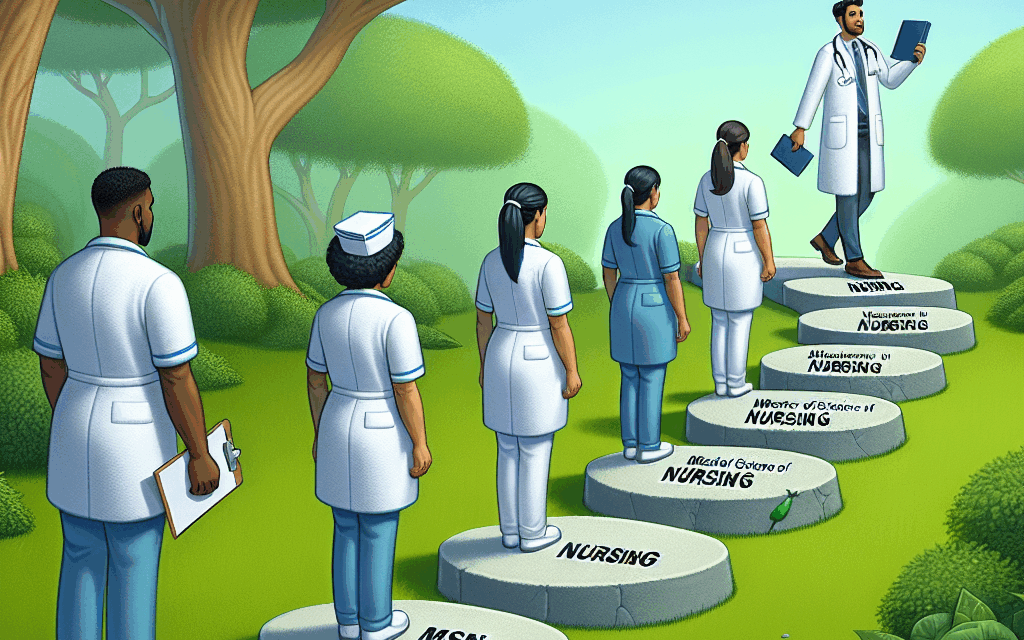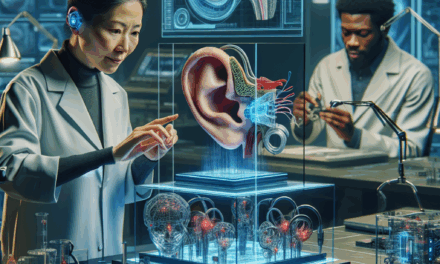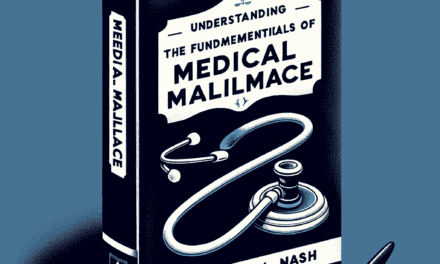Unlocking Career Paths and Growth with an MSN Nursing Degree
The healthcare landscape is evolving rapidly, and with it, the demand for highly skilled nursing professionals is on the rise. A Master of Science in Nursing (MSN) degree is becoming increasingly essential for nurses who aspire to advance their careers, take on leadership roles, or specialize in specific areas of healthcare. This article explores the various career paths available to MSN graduates, the benefits of obtaining this degree, and how it can unlock new opportunities for professional growth.
1. Understanding the MSN Degree: An Overview
The Master of Science in Nursing (MSN) is a graduate-level degree that prepares registered nurses (RNs) for advanced practice roles. The curriculum typically includes advanced clinical training, leadership, and management skills, as well as specialized knowledge in areas such as nursing education, healthcare policy, and informatics. The MSN degree is designed to build upon the foundational knowledge gained in a Bachelor of Science in Nursing (BSN) program.
According to the American Association of Colleges of Nursing (AACN), the number of MSN programs has increased significantly over the past decade, reflecting the growing recognition of the need for advanced nursing education. As of 2021, there were over 500 accredited MSN programs in the United States, with enrollment numbers steadily rising.
Key components of an MSN program often include:
- Advanced Pathophysiology
- Advanced Pharmacology
- Health Assessment
- Nursing Theory and Research
- Leadership and Management in Nursing
These courses equip nurses with the skills necessary to provide high-quality patient care, lead healthcare teams, and influence healthcare policy. Additionally, many MSN programs offer specializations, allowing nurses to focus on areas such as nurse practitioner roles, clinical nurse leadership, nursing education, or healthcare administration.
2. Career Opportunities for MSN Graduates
One of the most significant advantages of obtaining an MSN degree is the wide array of career opportunities it opens up. Graduates can pursue various roles in clinical practice, education, administration, and research. Here are some of the most common career paths for MSN graduates:
2.1 Nurse Practitioner (NP)
Nurse practitioners are advanced practice registered nurses (APRNs) who provide comprehensive care to patients. They can diagnose and treat illnesses, prescribe medications, and manage patient care independently or in collaboration with physicians. The demand for NPs has surged in recent years, driven by a growing emphasis on preventive care and the need for accessible healthcare services.
According to the Bureau of Labor Statistics (BLS), the employment of nurse practitioners is projected to grow by 52% from 2020 to 2030, much faster than the average for all occupations. This growth is attributed to an aging population and an increased focus on primary care.
2.2 Clinical Nurse Leader (CNL)
The Clinical Nurse Leader role is designed for nurses who want to improve patient outcomes and enhance the quality of care. CNLs are responsible for overseeing the coordination of patient care, implementing evidence-based practices, and leading healthcare teams. They play a crucial role in bridging the gap between clinical practice and administrative functions.
As healthcare systems increasingly focus on quality improvement and patient safety, the demand for CNLs is expected to rise. CNLs are often employed in hospitals, outpatient clinics, and long-term care facilities.
2.3 Nurse Educator
Nurse educators are responsible for teaching and training the next generation of nurses. They work in academic settings, such as universities and community colleges, as well as in clinical environments. Nurse educators develop curricula, teach courses, and mentor nursing students.
The need for qualified nurse educators is critical, especially as nursing programs expand to meet the growing demand for healthcare professionals. The AACN reports that nursing schools are struggling to fill faculty positions due to a shortage of qualified educators, making this a promising career path for MSN graduates.
2.4 Healthcare Administrator
Healthcare administrators manage the operations of healthcare facilities, including hospitals, clinics, and nursing homes. They are responsible for budgeting, staffing, compliance with regulations, and overall organizational efficiency. An MSN degree with a focus on healthcare administration equips nurses with the skills needed to excel in this role.
The BLS projects that employment of medical and health services managers will grow by 32% from 2020 to 2030, reflecting the increasing complexity of healthcare delivery systems and the need for effective management.
2.5 Nurse Researcher
Nurse researchers conduct studies to improve patient care, develop new treatments, and advance nursing practice. They work in academic institutions, research organizations, and healthcare facilities. An MSN degree with a focus on research prepares nurses to design studies, analyze data, and disseminate findings.
The role of nurse researchers is vital in shaping evidence-based practice and influencing healthcare policy. As the healthcare industry continues to evolve, the need for research-driven solutions will only grow.
3. The Benefits of Pursuing an MSN Degree
Obtaining an MSN degree offers numerous benefits that extend beyond career advancement. Here are some of the key advantages:
3.1 Enhanced Knowledge and Skills
One of the most significant benefits of pursuing an MSN degree is the opportunity to deepen one’s knowledge and skills in nursing. The advanced coursework and clinical training provide nurses with a comprehensive understanding of complex health issues, evidence-based practices, and innovative care models.
This enhanced knowledge not only improves patient care but also empowers nurses to take on leadership roles within their organizations. For example, a nurse with an MSN degree may be better equipped to implement quality improvement initiatives or lead interdisciplinary teams in a clinical setting.
3.2 Increased Earning Potential
Another compelling reason to pursue an MSN degree is the potential for increased earning potential. According to the BLS, the median annual wage for nurse practitioners was $111,680 in May 2020, compared to $75,330 for registered nurses. Similarly, clinical nurse leaders and nurse educators also command higher salaries than their BSN counterparts.
Investing in an MSN degree can lead to a significant return on investment over the course of a nursing career. Many employers also offer tuition reimbursement programs, further offsetting the cost of obtaining an advanced degree.
3.3 Greater Job Security
The demand for advanced practice nurses is expected to continue growing, providing greater job security for MSN graduates. As healthcare systems adapt to changing patient needs and an aging population, the need for skilled nursing professionals will remain high.
Additionally, many healthcare organizations are increasingly recognizing the value of advanced education in nursing, leading to more opportunities for MSN graduates in various settings. This trend is particularly evident in rural and underserved areas, where NPs and other advanced practice nurses play a critical role in providing care.
3.4 Opportunities for Specialization
MSN programs often offer various specializations, allowing nurses to focus on areas that align with their interests and career goals. Specializations may include:
- Family Nurse Practitioner
- Pediatric Nurse Practitioner
- Adult-Gerontology Nurse Practitioner
- Psychiatric-Mental Health Nurse Practitioner
- Nurse Midwifery
Specializing in a particular area of nursing can enhance job satisfaction and provide opportunities for professional growth. For instance, a nurse who specializes in pediatric care may find fulfillment in working with children and their families, while a nurse midwife may enjoy supporting women through pregnancy and childbirth.
3.5 Leadership and Advocacy Roles
With an MSN degree, nurses are well-positioned to take on leadership and advocacy roles within their organizations and communities. They can influence healthcare policy, advocate for patient rights, and lead initiatives that improve healthcare delivery.
For example, nurse leaders may work to implement evidence-based practices that enhance patient safety or advocate for policies that address health disparities in underserved populations. By taking on these roles, MSN graduates can make a meaningful impact on the healthcare system and contribute to positive change.
4. The Role of MSN Graduates in Shaping Healthcare Policy
As healthcare continues to evolve, the role of MSN graduates in shaping healthcare policy becomes increasingly important. Nurses with advanced degrees bring valuable insights and expertise to discussions about healthcare reform, access to care, and patient safety.
4.1 Advocacy for Patient-Centered Care
MSN graduates are often at the forefront of advocating for patient-centered care, which prioritizes the needs and preferences of patients in healthcare decision-making. They understand the importance of involving patients in their care plans and ensuring that their voices are heard.
For instance, nurse practitioners often work closely with patients to develop individualized treatment plans that consider their unique circumstances and preferences. By advocating for patient-centered care, MSN graduates contribute to improved health outcomes and patient satisfaction.
4.2 Addressing Health Disparities
Health disparities remain a significant challenge in the United States, with certain populations experiencing higher rates of chronic diseases and limited access to care. MSN graduates are uniquely positioned to address these disparities through their clinical practice and advocacy efforts.
For example, nurse practitioners working in underserved communities can provide essential services to populations that may otherwise lack access to healthcare. By focusing on preventive care and health education, they can help reduce health disparities and improve overall community health.
4.3 Influencing Healthcare Legislation
MSN graduates can play a vital role in influencing healthcare legislation at the local, state, and national levels. Their expertise in nursing practice and patient care positions them as credible advocates for policies that promote access to quality healthcare.
For instance, many nurse practitioners have successfully lobbied for legislation that expands their scope of practice, allowing them to provide care independently in states where such restrictions previously existed. These efforts not only benefit NPs but also improve access to care for patients.
4.4 Collaborating with Interdisciplinary Teams
MSN graduates often work as part of interdisciplinary teams that include physicians, social workers, and public health professionals. This collaborative approach is essential for addressing complex healthcare issues and developing comprehensive solutions.
For example, a nurse educator may collaborate with public health officials to develop community health programs that address specific health concerns, such as obesity or diabetes. By working together, these professionals can create more effective interventions that benefit the community.
4.5 Leading Quality Improvement Initiatives
MSN graduates are well-equipped to lead quality improvement initiatives within healthcare organizations. Their advanced training in evidence-based practice and leadership skills enables them to identify areas for improvement and implement strategies that enhance patient care.
For instance, a clinical nurse leader may lead a team in developing protocols to reduce hospital-acquired infections, resulting in improved patient outcomes and reduced healthcare costs. By taking on these leadership roles, MSN graduates contribute to the overall quality and safety of healthcare delivery.
5. The Future of Nursing: Trends and Opportunities for MSN Graduates
The future of nursing is bright, with numerous trends and opportunities on the horizon for MSN graduates. As the healthcare landscape continues to evolve, nurses with advanced degrees will play a crucial role in shaping the future of patient care.
5.1 Telehealth and Remote Patient Monitoring
The COVID-19 pandemic accelerated the adoption of telehealth services, allowing healthcare providers to deliver care remotely. MSN graduates are well-positioned to leverage telehealth technologies to improve access to care and enhance patient outcomes.
Nurse practitioners, for example, can conduct virtual consultations, monitor patients’ health remotely, and provide education on managing chronic conditions. As telehealth continues to grow, MSN graduates will play a vital role in its implementation and optimization.
5.2 Emphasis on Preventive Care
There is a growing emphasis on preventive care in healthcare, with a focus on promoting wellness and preventing chronic diseases. MSN graduates are uniquely qualified to lead initiatives that prioritize preventive care and health education.
For instance, nurse educators can develop community programs that promote healthy lifestyles, while nurse practitioners can provide screenings and preventive services to at-risk populations. By focusing on prevention, MSN graduates can help reduce healthcare costs and improve overall population health.
5.3 Integration of Technology in Nursing Practice
The integration of technology in nursing practice is transforming the way care is delivered. From electronic health records (EHRs) to mobile health applications, technology is enhancing communication, data management, and patient engagement.
MSN graduates are often at the forefront of implementing and optimizing these technologies in clinical settings. For example, a nurse informaticist may work to improve EHR usability, ensuring that healthcare providers can access and document patient information efficiently.
5.4 Focus on Mental Health
The importance of mental health has gained increased recognition in recent years, leading to a greater demand for mental health services. MSN graduates specializing in psychiatric-mental health nursing are well-equipped to address this growing need.
Nurse practitioners in this field can provide therapy, medication management, and support for individuals struggling with mental health issues. As mental health continues to be a priority in healthcare, the demand for qualified mental health professionals will only increase.
5.5 Lifelong Learning and Professional Development
The healthcare field is constantly evolving, making lifelong learning and professional development essential for nursing professionals. MSN graduates are encouraged to pursue continuing education opportunities, certifications, and advanced training to stay current with best practices and emerging trends.
For example, many MSN graduates choose to pursue Doctor of Nursing Practice (DNP) degrees or additional certifications in specialized areas of practice. This commitment to lifelong learning not only enhances their skills but also positions them as leaders in the nursing profession.
Conclusion
In conclusion, obtaining a Master of Science in Nursing (MSN) degree is a transformative step for registered nurses seeking to advance their careers and make a meaningful impact in healthcare. The diverse career opportunities available to MSN graduates, coupled with the benefits of enhanced knowledge, increased earning potential, and greater job security, make this degree a valuable investment in one’s future.
As healthcare continues to evolve, MSN graduates will play a crucial role in shaping the future of nursing practice, advocating for patient-centered care, and addressing pressing healthcare challenges. By embracing the opportunities that come with an MSN degree, nurses can unlock new career paths and contribute to the ongoing advancement of the nursing profession.
Ultimately, the journey toward obtaining an MSN degree is not just about personal growth; it is about enhancing the quality of care for patients and communities. As the demand for skilled nursing professionals continues to rise, those with an MSN degree will be well-prepared to lead the way in delivering high-quality, compassionate care in an ever-changing healthcare landscape.





